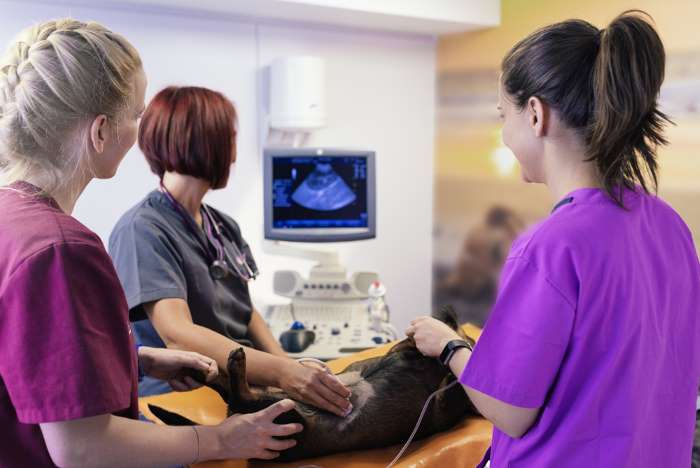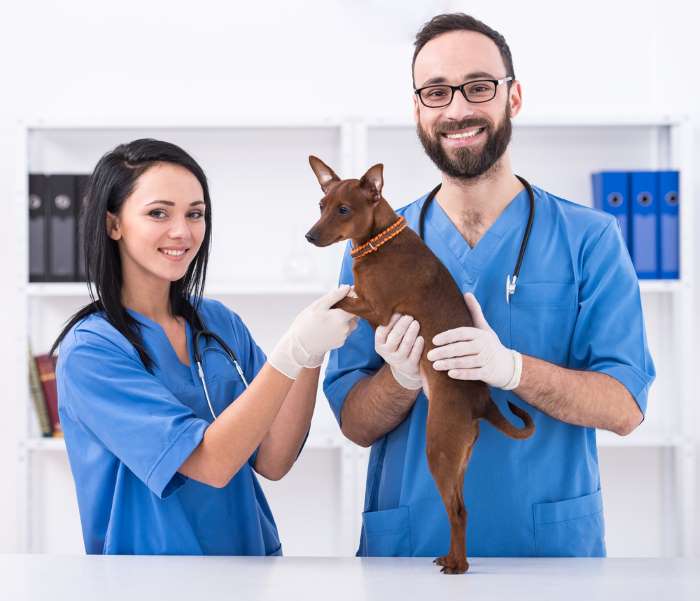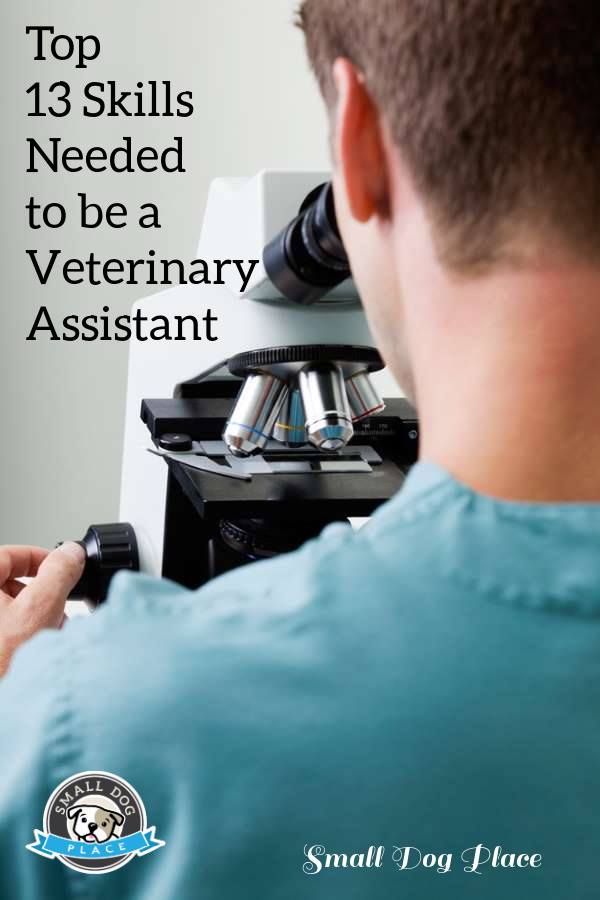Top 13 Skills Needed to be a Vet Assistant
Vet Assistant by Janice Jones
If you love animals, yet don't have the desire, or financial resources to become a veterinarian, you might want to consider a career as a vet assistant. This position requires a high school diploma but there are programs available to offer training

13 Skills Needed to Be a Vet Assistant
1. Computer Skills
While computer skills are needed in nearly all jobs, being able to quickly learn and use new technology and software programs is a big plus. Many modern veterinary hospitals and clinics are nearly paperless and rely on sophisticated soft ware programs not only for scheduling and record keeping but also for inventory control and outgoing appointment reminders.
Many vet assistants are also responsible for creating invoices and collecting payments all of which are done on a computer.
2. Professionalism
Just what does it mean to be a professional? Being Professional means acting in a way that shows a high level of work ethic. It is not only the behavior, but the attitude and appearance of the person.
A vet assistant that possess a high level of professionalism will be reliable, competent and courteous both to clients and fellow workers.
Formal education is not always necessary to be a vet assistant, but programs either online or in a hybrid program that includes classroom instruction can go along way towards giving you an edge on the competition for available jobs.
The best way to feel competent as a professional vet assistant is by taking animal care courses.
3. Communication Skills
Communication skills are needed in nearly all jobs these days, but a vet assistant not only works with animals but spends a considerable part of the day interacting with people from all walks of life. Some who are friendly, but many who are angry, fearful or simply don't understand why certain medicines or procedures are helpful for their pets. Then, there are those who are down right distraught at having to deal with the health or end of life concerns of their pets.
It is important to be able to convey accurate information from pet parents to the veterinarian. Equally important is being able to explain information about an animal's condition accurately and in a way that the pet owner can understand.
In a typical busy practice, instructions and information are passed along quickly and the vet assistant must understand instructions and be able to follow through or pass on information in an accurate manner.
The ability to read, write and speak in a second language is also a big plus in some locations.
4. Empathy
Empathy is the ability to understand and share the emotions or feelings of others. It is not sympathy, which is another quality that is often mistaken which means to feel sorrow for someone.
Pet owners often think of their pets as part of the family, a child for example. When their pet is ill or at the end stages of their lives, pet owners need support. It is often the vet assistant that a pet owner first encounters. Showing empathy means putting oneself into the shoes of another individual and looking at life from their prospective.
It doesn't mean neglecting your own duties but it does mean being able to communicate in a way that the pet parent feels understood and validated. Empathy is not a skill we, as humans are born with, but rather deliberately develop over time.
5. Time Management
There is a lot going on in a typical vet clinic on any given day. The ability to juggle many jobs in a timely manner is a big plus.
6. Tech Skills
Veterinary clinics rely on technology in all aspects of their practice. From lab, x-ray, and diagnostic equipment to surgery and front office software, vet assistants must be able to operate and feel at home with the latest technology used in the vet hospital.
Even if vet assistants work mainly in the front office, many veterinary hospitals are now considered "paperless" meaning that all medical records and scheduling is done totally online. The ability to learn various software programs for scheduling and accounting is vital to being successful as a vet assistant.
7. Good Health and Stamina

After the end of an 8 hour shift, are you exhausted or ready to move onto your next job or transition to the needs of your family at home with equal energy?
Stamina is so important for a vet assistant to have as much of the day is spent standing on one's feet or walking around or carrying sick animals. Being able to lift and move heavy equipment is often just part of the daily routine. So is being able to lift, carry and restrain heavy animals. For those who expect to sit for most of their day, this may not be the job for you.
8. Flexibility
One of the most interesting part of being a vet assistant is that one day is never like the next. As a vet assistant, you are likely to juggle many different roles each day. This can be a blessing for some and a nightmare for others.
In small hospitals, where there is no vet tech present, you might find yourself being lab tech, x-ray assistant, surgery nurse, janitor, dog walker, and receptionist, not to mention other duties all in the course of one day.
Being able to transition from surgery assistant, to lab tech, to janitor, to vet nurse, to receptionist, to cat groomer, to x-ray technician, to kennel assistant all before lunch is a plus for a vet assistant. Large practices normally have more defined roles but small clinics may rely on one or two assistants to carry on all roles.
9. Ability to Work Under Pressure
Another often sought after skill is the ability to stay cool, calm and collected under any circumstance. This is an excellent skill that is useful for working with people, but it is essential if your patients are animals. They can often sense our emotions and respond accordingly.
Most pets are stressed out when arriving at a vet hospital, even for routine care. They sense danger and some will respond in a typical fight or flight reaction. Calm vet assistants can help dogs and cats relax, but calm vet assistants are also needed for the two legged individuals that walk through their doors.
People are also emotional when it comes to their pets, and the ability to mange others' possible irrational reactions can be a highly sought after skill.
Juggling different roles and emotions at the same time can be difficult, but not unheard of from a veterinary point of view. Sometimes, vet assistants are put in a position where their triage skills must be used.
Emergencies do happen and the vet assistant is placed between the patients and the vet. A vet assistant who can manage the needs of patients and their owners with the scheduling of the routine office visits can make or break a vet clinic. Vet assistants unable to stay calm but rather panic can create an emotional environment that is not healthy or helpful for anyone.
10. Detail Oriented
Being detail oriented means being able to see all the trees from the forest. It means being able to identify and label all the details that will eventually create the whole story. Even the smallest details can make a big difference in the lives of pets.
The most successful vet assistants are very accurate while performing a wide variety of tasks that require attention to detail. Counting pills and correctly labeling containers, recording vital signs and carefully examining fecal samples for parasites are just a few of the many ways vet assistants use their abilities on the job.
Most important since this is a very hands-on job, vet assistants need to be able to understand subtle changes in pet behaviors and body language. Observation skills go hand in hand with being detail oriented.
11. Ability to Problem Solve
As a vet assistant, you are working under the supervision of a veterinary technician and/or veterinarian but there are many times where assistants need to solve problems on their own or as part of the team.
12. Desire to Improve and Learn
Things change. There is no denying that. Medicine is one of those areas that are constantly evolving, improving, and moving forward. Veterinary medicine often follows human interventions but also evolves from it's own extensive branch of research that not only helps pet owners but contributes to human health as well.
Continuing education is important in most every field.
13. Strong Stomach
Do you have a strong stomach? It seems like an odd trait to possess especially if you are interested in being a person who answers phones and makes appointments. The truth of the matter is that vet assistants must also deal with urine, blood, fecal matter and puppy vomit. on a regular basis.
It is not unusual for dogs to present with maggots wiggling in and out of wounds, eyeballs popping out of sockets, and the smell of gangrenous wounds haunting your next formal night out. And, that's just images from a small animal practice.
If your stomach is beginning to turn just reading this, then please think twice about a career as a vet assistant. We all have gag reflexes.
Mine came the day I knew I was pregnant with my first child and the dog I was attending after her spay vomited as she awoke from anesthesia with pure poop she had eaten prior to the surgery.
No, there was no janitorial staff, no kennel personnel, and no one else but me to clean up after this poor female dog. It was up to me, pregnant me, to clean up after this, a memory I have kept for at least 30 years.
Vet Assistant: Pin for Future Reference

Last Words
For anyone who loves animals, being a vet assistant can be a wonderful career choice. There are never two days alike and there is always a challenge or problem waiting around the corner to be solved. The job requires a skill set that many people acquire on the job but formal training is always a plus for getting your foot in the door, so to speak.
About Janice (author and voice behind this site)
Having lived with dogs and cats most of her life, Janice served as a veterinary technician for ten years in Maryland and twelve years as a Shih Tzu dog breeder in Ohio.
Her education includes undergraduate degrees in Psychology with a minor in biology, Early Childhood Education, and Nursing, and a master's in Mental Health Counseling.
She is a lifelong learner, a dog lover, and passionate about the welfare of animals. Her favorite breed for over 50 years has been the Shih Tzu, but she has also lived with Poodles, Maltese, Yorkshire Terriers, Beagles, English Bulldogs, Carin Terriers, and a Cocker Spaniel.
When not writing, reading, and researching dog-related topics, she likes to spend time with her eight Shih Tzu dogs, husband, and family, as well as knitting and crocheting. She is also the voice behind Miracle Shih Tzu and Smart-Knit-Crocheting
Does This Article Deserve Your Thumbs Up?
We always appreciate your support and encouragement. Your thumbs up means so much to us. Please like this article.
If you find this page or any page on Small Dog Place Helpful, or useful in anyway, I'd love it if you would click the small heart found on the bottom right of each page.
You can also share or bookmark this page -- just click on the:

Free Monthly Newsletter
Sign Up for Our Free Newsletter and get our Free Gift to You.
my E-book, The Top 10 Mistakes People Make When Choosing a Dog (and how to avoid them)

